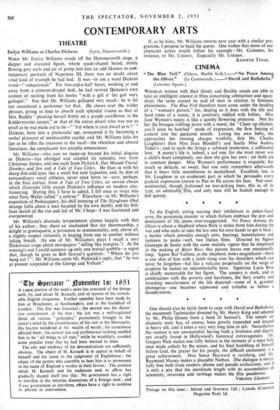CINEMA
"The Blue Veil." (Odeon, Marble Arch.) "No Peace Among the Olives." (La Continentale.) " David and Bathsheba." (Leicester Square.) WHEREAS women with their thirsty and flexible minds are able to take an intelligent interest in films concerning submarines and space- ships, the same cannot be said of men in relation to feminine phenomena. The Blue Veil therefore must come under the heading of a " woman's picture," for, dealing as it does with the life and bard times of a nanny, it is positively riddled with babies. Miss Jane Wyman's nanny is like a quietly flowering primrose. Not for her the brusque rubbing down with a towel, the " Cheer up chicken, you'll soon be hatched " mode of expression, the firm forcing of custard into the tutckered mouth. Losing her own baby, she approaches her ensuing charges wistfully, first Mr. Charles LauglUon's then Miss Joan Blondell's and finally Miss Audrey Totter's ; and to each she brings a subdued tenderness, a suffocated love. A nanny's life is, indeed, a sad one,-for she must never win a child's heart completely, nor dare she give her own ; yet both are in constant danger. Miss Wyman's performance is exquisite, her touch so delicate, so sweet, that one only remembers afterwards that it bears little resemblance to nannyhood. Excellent, too, is Mr. Laughton in an exuberant part in which -he persuades every puckish expression known to Pan to flit across his face. Not over- sentimental. though. ashioned on tear-jerking lines, this is, of its type, an admirablrfilm, and only men will be foolish enough to feel queasy.
* * ' * To the English, sitting nursing their inhibitions in poker-faced rows, the passionate-manner in which Italians embrace the joys and desolations of life seems over-exaggerated. No Peace Among the Olives is about a shepherd whose flock is stolen from him during the war and who seeks to take the law into his own hands to get it back ; a matter which provides enough sobs, beatings, lamentations and lustiness to make—well, two Italian films. Directed by Signor Giuseppe de Santis with the same realistic vigour that he employed in the making of Bitter Rice, this picture leaves one emotionally limp. Signor Raf Vallone, as the shepherd, looks magnificent—there is one shot of him with a lamb slung over his shoulders which can never be forgotten—but like a volcano perpetually on the verge of eruption he makes an uncomfortable hero. Signorina Lucia Bose is chiefly memorable for her figure. The scenery is stark, and in combination with the poverty and harshness, the fiery cruelty and brooding mercilessness of the life depicted—some of, it, granted, photogenic—one becomes- oppressed and irritable as before a thunderstorm.
* * * One should also be fairly fresh to cope with David and Bathsheba, the mammoth Technicolor directed b3 Mr. Henry King and adapted by Mr. Philip Donne from a book of Samuel's. The simple yet dramatic story has, of course, been greatly expanded and draped in heavy silk, and it takes a very very long time to tell. Nevertheless the venture is not unsuccessful, having both a liveliness and dignity not usually found in Hollywood's historical extravaganzas. Mr. 'Gregory Peck makes one fully believe in the torment of a -once holy man made unholy by the senses, and his final humbling of himself before God, the prayer for his people, the difficult atonement, is a great achievement. Miss Susan Hayward is ravishing, and Mr. Raymond Massey makes a plausible Nathan. -The dialogue is merci- fully free both from modern idioms and pseudo archaicisms, and it is only a pity that the inordinate length with its accumulation of solemnity, reverence and verbiage makes the film ponderous. VIRGINIA GRAHAM.


































 Previous page
Previous page